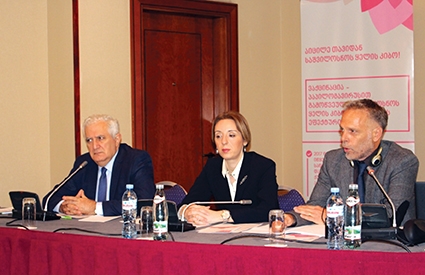Vaccinations against HPV: The Road to Preventing Cancer
On November 15, at Courtyard Marriott Hotel Tbilisi, a national conference entitled ‘Implementing Vaccine against Human Papilloma Virus (HPV)’, was held, organized by the National Center of Disease Control and Public Health, under the Georgian Ministry of Labor, Health and Social Affairs. The event was supported by World Health Organization (WHO).
Papilloma virus represents the most wide-spread virus infection of the urinary tract (UTI) and reproductive organs, amongst other diseases in women as well as men. According to the data of WHO, 630,000 cancer cases are registered among women, caused by papilloma virus, among which 530,000 (84%) are cervical cancer cases. There are 266,000 reported cases of mortality from this, which represents 8% of the mortality figure of cancer cases in women. As far as frequency is concerned, cervical cancer is in fourth position globally, and in fifth position in Europe. In Europe, over 67,000 cervical cancer cases have been registered, with 28,000 resulting in death.
Oncological diseases remain an important challenge for the Georgian health care system. 70% of new cases of new cancer diagnoses is in the 30-70 age groups whilst 26% is over the age of 70. Only 1% of these cases is within the age group of 0-15, and 0.4% - among 15-19. 24% of all female age groups is between the ages of 15-49.
WHO realizes that cervical cancer and other diseases connected with human papilloma virus represent an acute problem on a global scale, from the point of view of protecting public health, and includes the recommendation to include the vaccine against HPV in the national immunization programs. From 2006, the aforementioned vaccine was implemented in 71 countries (31%), among which are the USA, Austria, Australia, Belgium, Israel, United Kingdom, Italy, Canada, France, Greece, Latvia, Luxemburg, Denmark, Finland, Czech Republic, Cyprus, Lithuania, Slovenia, Croatia and others. Over 100 million people worldwide have been vaccinated. Vaccination represents an effective way to protect women against cervical cancer – almost 95-100% of vaccinated patients develop anti-bodies. HPV comprises of the types (type 16 and type 18) which are the most wide-spread, causing cervical cancer or genital warts. Vaccines also guarantee’s the protection from the strains of HPV which are not in the vaccine.
In 2016, with the support of the Global Alliance of Vaccination and Immunization (GAVI), the vaccine against HPV was implemented in 23 countries. Support from the alliance will enable the all parties to protect 40 million girls from cervical cancer by the year of 2020. In this way, it is calculated that 900,000 deaths will be avoided globally. GAVI gives an opportunity to various countries, including Georgia, to vaccinate 9-year-old girls who were born in the years of 2008-2009, free of charge, within the period of 2017-2019. Considering the fact that the support of the alliance is sufficient for the two-fold vaccination of 15,000 girls, the vaccination will be delivered to Tbilisi, Kutaisi and two autonomous republics of Ajara and Abkhazia. It is a pilot program, which in case of success will become a ground for a gradual implementation of HPV in the country, and will drastically decrease the cases of diseases caused by HPV. The best age for vaccination is the 9-14 age group, which boosts a formation of strong and effective immune responses before starting a sexual life. In most cases, the infection arrives before the age of 25, shortly after the start of sexual contact.
The minimal interval between the two-fold vaccinations is 6 months. HPV is safe, and has almost no side effects. It is recommended to see ta doctor in case of any side effects. “This vaccine is only implemented on the market 11 years ago. Research suggests that two-fold vaccinations can ensure protection for the rest of patients’ lives. There are no cases of cancer among the first cohorts of vaccinated girls. The papilloma virus is a perfidious illness because it has no symptoms. Nobody can diagnose its existence before the pre-cancer or cancer symptoms emerge. Around 200 women die of cervical cancer per year in Georgia,” Paata Imnadze, Scientific Head of National Center of Disease Control and Public Health told us.
“Cervical cancer is a very serious public health issue in countries of the WHO European region, and also in Georgia. It is very important to have a comprehensive approach to vaccinate girls early in their life to protect them through their lives, and then, to have a cervical cancer screening to make sure that the risk can be detected through screening. Why is vaccination so important? It prevents not only cervical cancer but also other cancers which can be caused by HPV,” Liudmila Mosina, Technical Officer of WHO regional office for Europe, commented.
“Today’s conference is very important. I represent Kutaisi, which has been selected. I used to work at the screening program for 5 years. This problem is quite topical. Sexual life has rejuvenated, and that is why, I believe, that vaccinations will contribute a lot to protect girls, and boys too, from cancer” Irma Ioseliani, gynecologist- reproducer told us.
The free vaccinations against HPV will begin from December 1 at relevant polyclinics.
Maka Lomadze












